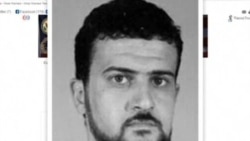PENTAGON —
U.S. officials hope to learn more about how al-Qaida operates and its plans for future attacks as they interrogate Abu Anas al-Libi, a Libyan seized by U.S. commandos during a raid in Tripoli Saturday.
Abu Anas al-Libi was indicted in a New York federal court in the year 2000 for his alleged role in the 1998 bombings of the U.S. embassies in Kenya and Tanzania.
Now, U.S. officials say he is detained on a U.S. Navy ship in the Mediterranean and is expected to be tried in a U.S. federal court rather than in Guantanamo, where other terror suspects have been held for years without trial.
Jennifer Daskal, a law professor at American University who has written about the Guantanamo proceedings of other suspects, says not sending Abu Anas to the U.S. naval base in Cuba could mean the process will be faster.
“The federal courts have an established record. They're capable of handling these cases. They're credible. There's not the endless challenges and questions about issues related to jurisdiction, issues related to attorney client privileges, issues related to what kinds of evidence comes in, that bedeviled the military commissions since their start," said Daskal.
U.S. commandos seized Abu Anas from his car on this street in Tripoli Saturday.
With the indictment already complete and much of the evidence gathered, Daskal says the U.S. is seeing what he can tell them about al- Qaida.
“My guess is that they've employed what's known as the high value interrogation group that's comprised of experts from the FBI, from the Department of Defense, to use their expertise and use their knowledge to gather as much intelligence, as much actionable intelligence from Mr. al-Libi as quickly and in the most effective way possible," she said.
At about the same time that U.S. special forces seized Abu Anas, American commandos tried but failed to capture Abdikadir Mohamed Abdikadir - also known as Ikrima - a top commander of al-Shabab in Somalia. The group was behind the recent attack on Nairobi's Westgate mall.
The U.S. says Ikrima is a close associate of those behind the 1998 embassy bombings.
Pentagon officials say the two operations were not related. But analysts say they were launched almost simultaneously in order to prevent the militants from preparing for the attack.
Abu Anas al-Libi was indicted in a New York federal court in the year 2000 for his alleged role in the 1998 bombings of the U.S. embassies in Kenya and Tanzania.
Now, U.S. officials say he is detained on a U.S. Navy ship in the Mediterranean and is expected to be tried in a U.S. federal court rather than in Guantanamo, where other terror suspects have been held for years without trial.
Jennifer Daskal, a law professor at American University who has written about the Guantanamo proceedings of other suspects, says not sending Abu Anas to the U.S. naval base in Cuba could mean the process will be faster.
“The federal courts have an established record. They're capable of handling these cases. They're credible. There's not the endless challenges and questions about issues related to jurisdiction, issues related to attorney client privileges, issues related to what kinds of evidence comes in, that bedeviled the military commissions since their start," said Daskal.
U.S. commandos seized Abu Anas from his car on this street in Tripoli Saturday.
With the indictment already complete and much of the evidence gathered, Daskal says the U.S. is seeing what he can tell them about al- Qaida.
“My guess is that they've employed what's known as the high value interrogation group that's comprised of experts from the FBI, from the Department of Defense, to use their expertise and use their knowledge to gather as much intelligence, as much actionable intelligence from Mr. al-Libi as quickly and in the most effective way possible," she said.
At about the same time that U.S. special forces seized Abu Anas, American commandos tried but failed to capture Abdikadir Mohamed Abdikadir - also known as Ikrima - a top commander of al-Shabab in Somalia. The group was behind the recent attack on Nairobi's Westgate mall.
The U.S. says Ikrima is a close associate of those behind the 1998 embassy bombings.
Pentagon officials say the two operations were not related. But analysts say they were launched almost simultaneously in order to prevent the militants from preparing for the attack.





